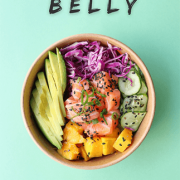Celiac Disease – Can it Affect Body Image & Concept of Masculinity?
 A university student with celiac disease shares how his condition has affected his body image and concept of masculinity.
A university student with celiac disease shares how his condition has affected his body image and concept of masculinity.
- by Imogen Higgins & Elle Woods-Marshall, palatinate.org.uk 1
Celiac disease is an intolerance to gluten, the protein found in wheat, barley and malt. If gluten is consumed by a celiac, it causes inflammation and damage to the small intestine. Many people with celiac disease suffer from bowel disorders when they eat gluten, but the individual we spoke to is asymptomatic. Before he was thirteen, there were no obvious signs of his condition, except from the fact that he was very underweight.
He described how it would take him three hours to eat a plate of pasta at the kitchen table after school due to how difficult it was to digest food. He stated that “if someone had told me about celiac disease before I was thirteen, I could have told you I had it.” At the time, knowledge of celiac disease was not as thorough as today. A child in his situation now, he believes, would be diagnosed earlier.
I avoided going swimming because it involved taking my top off.
We asked about how he manages at university; he found that moving into his second-year house was much easier than living in college. Although, he was keen to emphasize that he “cannot fault” Hatfield for how they helped him. He now has his own toastie machine and toaster in his house (with gluten-free labels) and can control what he eats.
Our focus for the interview was how celiac disease affected his feelings about body image. A key factor in this is being unable to drink beer because it contains gluten. He explained that when he was younger and his friends began to experiment with alcohol, it was easy for them to get hold of beers from their parents. Since he could not do this, he ended up drinking more spirits than he should have.
It is also a problem when he goes on holiday with friends in Europe, finding cider abroad is much harder than in England. The effect of drinking a pint of Guinness, versus a double vodka coke, is very noticeable and has led to him getting into some messy situations. Although being unable to ‘have a beer with the lads’ has not made him feel totally isolated, his explanation makes it clear that being celiac does have an impact on how you navigate growing up.
When asked about the impact of celiac disorder on his body image, the first thing he said was that “until I was sixteen, I avoided going swimming because it involved taking your top off.” Celiac disease often entails being underweight, and this made him feel insecure in a society which promotes the image of men as “big.”
The early years of secondary school were difficult because his two brothers were both “prolific rugby athletes”, whilst he was unable to play rugby because of his weight. “Four out of five lunch breaks” would involve rugby training and he recalls being unable to participate in these training sessions. On Saturdays his friends would go to rugby games together. He knew that friendships were being built on those bus journeys and felt like he missed out.
Being celiac is difficult, but finding friends that support you without judgement
helps to make you feel more secure in your body.
He no longer experiences feelings of societal discomfort because of being celiac. Over time he made trustworthy friends and feels that he would never feel insecure about being celiac in front of them. Instead, he highlighted how he feels uncomfortable going out for dinner because he does not want to raise an issue and be a “hassle”. Many people are gluten-free today, for valid health reasons, but he explained that to some extent it has become a fad, damaging the celiac community.
People ask for gluten-free food at restaurants in a “flimsy” way and concede that they can have those “croutons” on their meal. The restaurant community have therefore built up a perception that when people ask for gluten-free food it isn’t important. We need to have respect for the celiac community, and he believes that if you go gluten-free you have to “do it properly”.
Being celiac is difficult, but finding friends that support you without judgement helps to make you feel more secure in your body. His main advice concerning masculine body concerns was to remember that every “bloke” has concerns about their body, especially during adolescence. Often bullying someone for their body type arises from the bullies own insecurity about their body.
1 https://www.palatinate.org.uk/growing-up-with-celiac-disease













